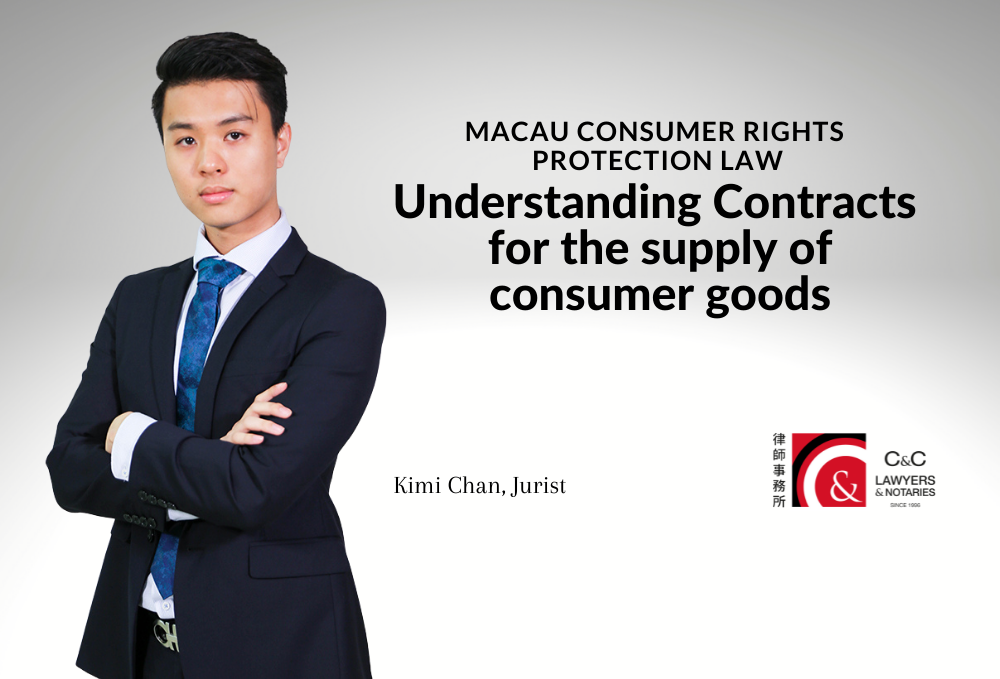
by: Kimi Chan, Jurist
Law no. 9/2021, “Law for the protection of consumer rights and interests”, currently in force, regulates contracts for the supply of consumer goods (Chapter V, Section I). The Law clearly defines the scope of application of the legal rules of these contracts: contracts for the purchase and sale of consumer goods and contracts for the supply of consumer goods, including the work contract and the lease contract.
For the purposes of applying the regime, it is necessary to clarify the type of consumer good, that is, whether:
The Consumer Rights and Interests Protection Law provides that the commercial operator must deliver consumer goods that comply with the contract.
But what is a consumer good according to the contract?
The conformity of the consumer good with the contract must be determined on a case-by-case basis, but in particular, the consumer good must meet the following conditions:
It should be noted that the consumer good is legally considered to comply with the contract if, before the conclusion of the contract, the commercial operator informs and explains to the consumer this lack of conformity. This is because if the consumer chooses to contract with the operator within the assumptions mentioned above, he accepts the existence of the aforementioned “lack of conformity”. Thus, the exercise of the rights granted to consumers by Law, based on the lack of conformity between the consumer good and the contract, constitutes an abuse of right.
There may not be an explicit agreement between the consumer and the commercial operator in our day-to-day life.
How should consumer goods be judged to comply with the contract?
The Law assumes compliance with the contract of consumer goods supplied by the commercial operator, provided that:
Lack of conformity between the consumer good and the contract
Firstly, to determine whether the consumer goods according to the contract, it must be checked by reference to their state when the good is delivered to the consumer. That is, we check whether the consumer goods delivered are in conformity with the contract at that time, irrespective of your state at the time of conclusion of the contract.
The commercial operator is responsible for the lack of conformity of the consumer good for one year from its delivery, which we refer to as the one-year liability period.
In the case of verification of lack of conformity of the consumer good within six months from the date of delivery of the consumer good, it is assumed that it already existed at the time of delivery.
The Law here establishes a special protection mechanism for consumers since the legislator, taking into account that it requires consumers to prove that the “lack of conformity” really proves to be extremely difficult at the time of delivery, so if in the first six months of delivery if there is a lack of conformity in the consumer good, the consumer does not need to prove the existence of lack of conformity at the time of delivery. Unless the operator (1) can prove that the lack of conformity occurred after delivery of the consumer good, or (2) the consumer good is perishable or (3) the respective lack of conformity, taking into account its characteristics, could never have existed at the time of delivery of the good. In these three cases, the presumption mentioned above favouring the consumer is rejected.
What are the specific rights of consumers when they discover that the consumer good does not conform to the contract?
Consumers may, free of charge, require the commercial operator to repair, replace, reduce the price or terminate the consumer good’s contract. In principle, consumers may choose to exercise any of these rights, that is, there is, in principle, no precedence, unless such exercise is impossible, the demands on the commercial operator are disproportionate or constitute an abuse of right, in which case, the consumer can only choose to exercise those rights that are still possible, proportionate or that do not constitute an abuse of rights.
If the consumer chooses to demand the repair or replacement of consumer goods, the commercial operator must, in principle, complete it within 30 days from the date of return. If repair or replacement is not possible within 30 days, the consumer may choose to exercise other rights, such as a price reduction or termination of the contract.
On the other hand, for more effective protection of consumers, provided that the consumer informs the trader that the consumer good does not comply with the contract if the consumer is prevented from using the consumer good due to the need for inspection, repair or replacement of the consumer good, the time during which the consumer is prohibited from using the consumer goodwill not be counted towards the aforementioned one-year liability period.
Temporary limitation of consumer rights
If the consumer detects a discrepancy between the consumer good and the contract, he must report it to the commercial operator within 30 days after detection. If, after 30 days, it has not been communicated, its right expires and cannot be exercised again;
If the consumer denounces, within 30 days of detection, the non-conformity of the consumer good, the consumer must inform the commercial operator of the exercise of his rights within six months following the denouncement; otherwise, his rights expire ( including the right of legal action for the exercise of the rights mentioned above and arbitration).
For more information on this subject and the specifics of your case, please contact C&C Lawyers & Notaries.
Kimi Chan, Jurist | kimi@ccadvog.com